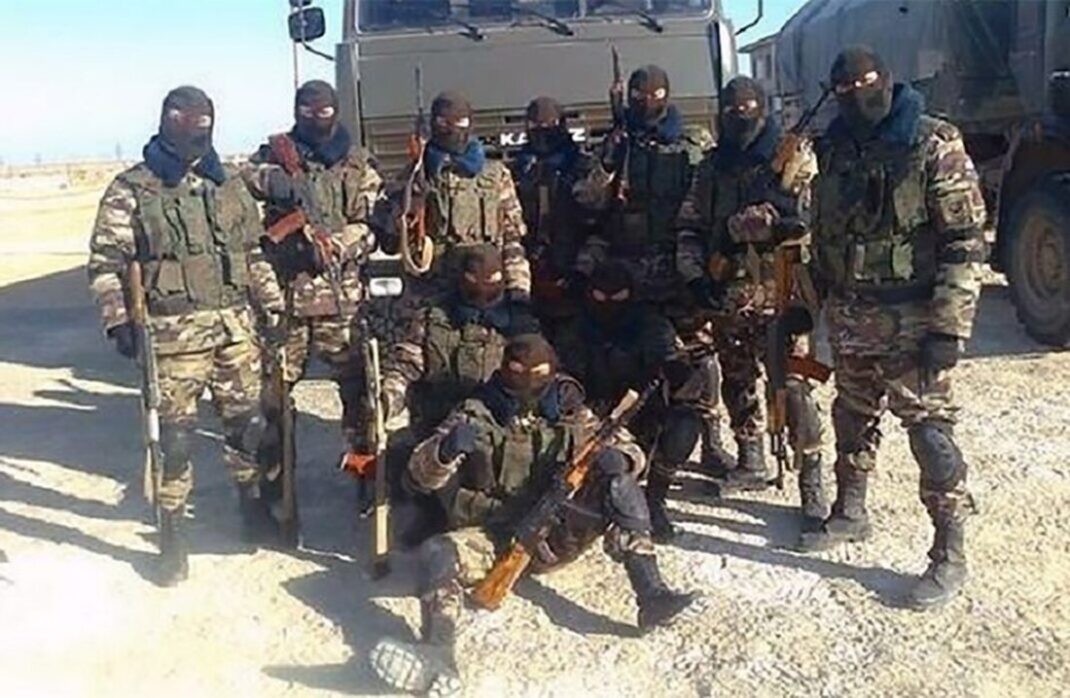By Bel Trew & Rajaai Bourhan


Libya has morphed into the world’s newest proxy conflict and at its heart is a labyrinth of mercenary recruitment stretching across Russia, Syria and Turkey.
.PART (II)
Fighting to feed yourself
Despite these difficulties, by May, Haftar would realise he was losing the war. In the weeks before, it was already apparent that Turkey’s fraught recruitment efforts were translating into military successes. With GNA forces recapturing territory, Haftar’s international backers also looked to Syria to plug a manpower shortfall.
Libya’s eastern administration linked to Haftar even opened an embassy in Damascus in March, announcing they would fight Turkey-backed militant groups together with Syrian president Bashar al-Assad.
And so, as Abu Ahmed was busy signing up in Idlib near Turkey’s border in February, hundreds of kilometres south in the regime-held areas of Douma, Daraa and Suweida, Kremlin-linked private military companies sent recruiters to villages to convince young men to join Haftar’s side.
UN experts, investigating arms embargo violations, believe that between 1 January and 10 March there were 33 Cham Wings flights from Damascus to Benghazi, likely transporting Syrian mercenaries. (The Syrian airline was sanctioned by the US in 2016 for providing financial support to the Assad regime and transporting Syrian troops.)
The same UN probe said in January this year Russian recruiters were first sent to Douma offering $800 a month. With little pick up, the salaries promised were increased to over $1000 and recruiters moved to a small pocket in Suweida, a centre of Syria’s Druze religious minority.
In March, recruiters shifted their focus to Daraa, a region close to Syria’s border with Jordan. There, according to three people whose friends and family were approached to sign up, they started tapping into brigades of reconciled ex-rebels that made up a special branch of the “Fifth Assault Corps” one of the premier Russian-backed formations in Syria.
These young men were easier to convince. Ex-rebels who pledge allegiance to Assad typically earn less than $30 a month as regime soldiers. They are often harassed by regime security forces who are distrustful of them and so impose harsh restrictions on the jobs they can secure and their movement.
Omran Musalmah, a Syrian activist from Daraa, who is in close contact with villages targeted by the recruitment drive, said Wagner-organised recruiters not only promised to pay the reconciled fighters $1,200 a month, but to stop that harassment.
“They were told the mission would be securing oil fields and Russian facilities. If they agreed, the security forces would stop the abuse against them,” Musalmah said.
“But when they reached the training camps in Homs they learned they were going to fight with Haftar against the government in Tripoli. Most went home.“
By April, the story repeated itself in Quneitra, an area close to the border with Israel. There Elizabeth Tsurkov, a Syria expert at the Foreign Policy Research Institute who spoke to community members, said the men signed up because their families “were going hungry”.
“This is only happening because of immense need,” Tsurkov told The Independent. “They have no alternatives”.
As Haftar’s offensive began to stall his recruiters ramped up their efforts. By June, he lost the strategic Wattiya airbase, at least nine multimillion-dollar defence systems and Tarhuna, his chief re-supply line.
In the weeks prior, Russian recruiters trawled Syria’s southern Hama countryside, areas of neighbouring Homs, as well as the eastern province of Deir Ezzor, according to local sources.
The process was fraught. In southern Hama, residents of villages told The Independent it took a month to convince anyone to sign up. “A hundred eventually made it to Khmeimim, [Russia’s main airbase in Syria] on 8 May ready to be deployed to Libya days later,” said one man, whose family still lives in the area. He asked to remain anonymous.
The Independent was told by multiple sources they likely boarded a 11 May Cham Wings flight from Khmeimim airbase in Latakia to east Libya. Maritime observer Yoruk Isik, who tracks Cham Wings flights between the two countries using open source software, watched that particular flight with interest.
He told The Independent it was one of the first and only times Cham Wings had left a transponder along that route. The planes usually vanish from tracking apps above Benghazi.
But this time the plane quietly descended on Khadim – an east Libyan base UN investigators claim was set up by the UAE . It’s an odd destination for a commercial airline.
Little is known about exactly where the fighters end up. Diplomats briefed on the UN investigation said as soon as they board planes, after a final phone call back home, their mobiles are confiscated.
On arrival, they are issued “burner” phones – with no access to the internet – so they can communicate with each other but not with the outside world.
Moscow’s mercenary men
On Haftar’s bases across Libya, disagreements are notoriously frequent. The problem is, one international military observer said, the general has limited foreign advisers that he rarely listens to. It didn’t help that “he and his staff do not understand modern warfare,” the official added. Tensions between his command and Wagner have reportedly soared.
Russian mercenaries first emerged in east Libya in 2018 repairing military vehicles. Most, including UN investigators, point the finger at Wagner – nicknamed Russia’s Blackwater.
But Neil Hauer, an independent expert on the group, said Wagner is actually a catchall phrase for a number of “nebulous arms-length private military companies” that have emerged over the last few years with ties to Russia’s Ministry of Defence.
Wagner was created in 2014 during Russia’s war in Ukraine and first deployed in Syria two years later. But it had “its wings clipped” in February 2018 after a messy shoot-out with American forces in Syria upset the Kremlin, according to Hauer and international diplomats.
And so, UN investigators said alongside Wagner multiple smaller private military companies were deployed to Libya. Whoever is responsible for the recruitment of Russian combatants, they first appeared on the west Libya frontlines in September, according to international diplomats.
Russian identity cards and personal items, apparently left behind during a retreat, were discovered in the battlefields around Tripoli. At some point the Russia military deployed its own forces to Libya, possibly in advisory roles.
A BBC investigation found that the first Russian commissioned officer died in Libya in February. The 27-year-old soldier was later buried in his Russian hometown in a heavily policed funeral.
The Russian defence ministry did not reply to a request from The Independent for comment. Russian president Vladimir Putin has vehemently denied the accusations that Russia is funnelling fighters and equipment to Libya. When asked in January about Wagner, he replied that if there are Russians in Libya, they do not represent the Russian state.
But as one western diplomat put it, it is safer to deploy a group like Wagner than the military, “it is a lot of strategy for not many roubles”. That was echoed by US Africa Command, which confirmed to The Independent Russia has flown a mix of 14 MiG-29 fighters and Su-24 fighter-bombers to Jufrah, Haftar’s main airbase in central Libya.
A spokesperson said Washington believes that Russia was employing Wagner in Libya as part of a Kremlin strategy to “expand its influence across the Mediterranean and the African continent”.
“Russia employs state-sponsored [mercenaries] in at least 16 African countries to obfuscate Moscow’s direct role and to afford plausible deniability,” the spokesperson added.
Who’s paying the bills?
Back in Tripoli, speculation about the Russian mercenary salaries is rife. “They must get a huge amount,” one GNA fighter wrote on WhatsApp. “Otherwise why would they agree to fight?”
A three-month contract in Libya for all the fighters is estimated to cost nearly $175m, according to UN investigators. No one believes Haftar can finance that on his own.
Some allege Russian businessman Yevgeny Prigozhin, who is nicknamed “Putin’s chef” for his Kremlin catering contracts, is the shadowy financier of Wagner.
Turkey’s president Recep Tayyip Erdogan, meanwhile, has accused Abu Dhabi of bankrolling the enterprise in a fiery speech where he dismissed Haftar as a “desert lord”.
UN investigators have long accused the Emirates of providing material support to Haftar’s forces. As early as 2017 a panel of experts report said the UAE had sent drones, planes, attack helicopters and armoured vehicles to Libya, stationing them at Khadim, an airbase Abu Dhabi built up.
The UAE authorities did not respond to The Independent’s request for comment on Libya. But the Emirates have repeatedly denied funnelling weapons to Libya and maintain they are supporting a “peaceful political solution” to the crisis. Last week they once again rejected claims by the GNA they were involved in Haftar’s military operations.
There were, however, Dubai links to a botched attempt last year by Haftar to hire western mercenaries, including five Brits.
A recent confidential UN probe found that, in the middle of the battle for Tripoli, Haftar paid a team of 20 foreign mercenaries, upwards of $120,000 to create a marine strike force to prevent Turkish-supplied weapons reaching the GNA.
The western soldiers-of-fortune arrived in Libya last June but fell out with Haftar and fled the country by boat just days after they arrived.
Two diplomats briefed on the probe said two Dubai-based companies were named as allegedly masterminding the deals. Both companies denied their involvement in a statement to The Independent.
The future
Whoever is footing the bills, Haftar’s stunning defeat has dealt a crushing blow to his foreign backers who are scrabbling to renegotiate their positions. “They are quickly realising it is not that easy. Throwing some contractors into the mix will not see Haftar sweep to victory,” said analyst Hauer.
Egypt, which had taken a back seat in Libya, appeared to return to the ring hosting one-sided peace talks in Cairo last weekend. There Haftar agreed to a unilateral ceasefire provided – ironically – the GNA sends its foreign mercenaries home.
This was roundly rejected by the recognised government who instead declared a new offensive to take Sirte and Jufrah airbase, over 500km southeast of Tripoli.
As bloody battles have raged in Sirte, videos have appeared online this week allegedly showing Egyptian military build up along its border with Libya, which some have read as a warning sign to the GNA to back down. Throwing some contractors into the mix will not see Haftar sweep to victory
Jalel Harchaoui, a Libya expert at the Clingendael Institute, said that under the alleged deal between Ankara and Moscow, Sirte was not supposed to be taken by force. West Libyan forces have marched too far east.
“Cairo is under tremendous pressure on the part of the UAE and to some extent Saudi Arabia to take a firmer stand,” he added. Cairo, reportedly unhappy about the Tripoli offensive in the first place, is likely waiting for the outcome of the rumoured Turkey-Russia deal.
That may be determined by movement of forces on the ground. Officials within the GNA’s interior ministry told The Independent they would not stop until they had taken Sirte and Jufrah and were even mulling marching on the Haftar-held oil crescent too.
The UN has said that the warring parties had agreed to restart ceasefire talks but ongoing fighting undermines that. Trapped in the middle are the mercenaries. Fresh Syrian recruits for the GNA’s new offensive are due to land early this week, according to multiple sources.
Syria was killing me, Libya was the only way out. Abu Ahmed’s fighting contract, however, is due to end in the coming days.
Over the last month he has come full circle and is now debating whether to stay in Libya where there are better chances of finding a job than in Syria, ravaged by a crushing financial crisis. It is also easier and cheaper to get to Europe from Libyan shores.
“Syria was killing me, I needed to leave in any way possible but had no chances. Libya was the only way out,” he says his voice thick with regret. “My only thought about coming here was that I could make some money and cross the sea to Italy which I still want to do.” “Europe is my only hope.”
***
Bel Trew is The Independent’s Middle East Correspondent, based in the region. Bel has covered the region since the start of the Arab Spring in 2011, and has reported on uprisings and subsequent conflicts in Egypt, Libya and Yemen. She has also covered the last two wars between Israel and Gaza, and followed the emergence of Isis in Tunisia.
Rajaai Bourhan is a Europe-based Syrian journalist who was living in Syria until 2018. He is based in Madrid | Periodista sirio en Madrid | Amante de la historia.
___________
The Independent




